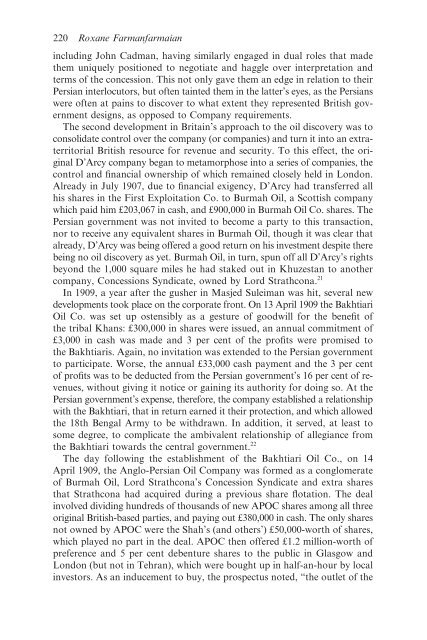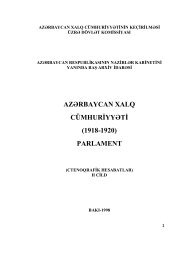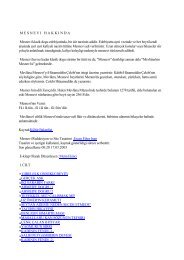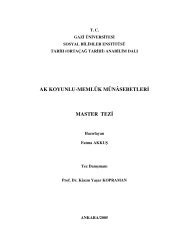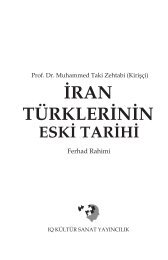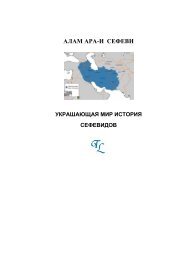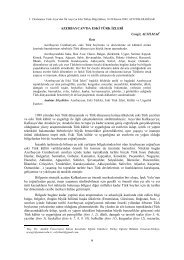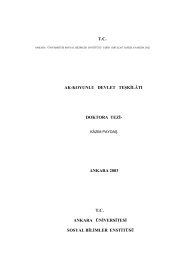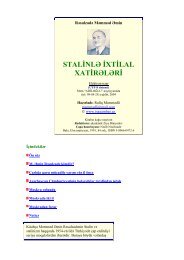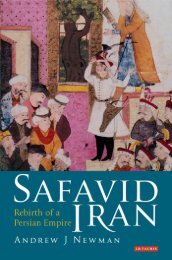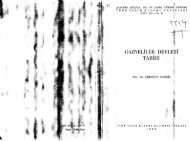War and Peace in Qajar Persia: Implications Past and ... - Oguzlar.az
War and Peace in Qajar Persia: Implications Past and ... - Oguzlar.az
War and Peace in Qajar Persia: Implications Past and ... - Oguzlar.az
- No tags were found...
You also want an ePaper? Increase the reach of your titles
YUMPU automatically turns print PDFs into web optimized ePapers that Google loves.
220 Roxane Farmanfarmaian<strong>in</strong>clud<strong>in</strong>g John Cadman, hav<strong>in</strong>g similarly engaged <strong>in</strong> dual roles that madethem uniquely positioned to negotiate <strong>and</strong> haggle over <strong>in</strong>terpretation <strong>and</strong>terms of the concession. This not only gave them an edge <strong>in</strong> relation to their<strong>Persia</strong>n <strong>in</strong>terlocutors, but often ta<strong>in</strong>ted them <strong>in</strong> the latter’s eyes, as the <strong>Persia</strong>nswere often at pa<strong>in</strong>s to discover to what extent they represented British governmentdesigns, as opposed to Company requirements.The second development <strong>in</strong> Brita<strong>in</strong>’s approach to the oil discovery was toconsolidate control over the company (or companies) <strong>and</strong> turn it <strong>in</strong>to an extraterritorialBritish resource for revenue <strong>and</strong> security. To this effect, the orig<strong>in</strong>alD’Arcy company began to metamorphose <strong>in</strong>to a series of companies, thecontrol <strong>and</strong> f<strong>in</strong>ancial ownership of which rema<strong>in</strong>ed closely held <strong>in</strong> London.Already <strong>in</strong> July 1907, due to f<strong>in</strong>ancial exigency, D’Arcy had transferred allhis shares <strong>in</strong> the First Exploitation Co. to Burmah Oil, a Scottish companywhich paid him £203,067 <strong>in</strong> cash, <strong>and</strong> £900,000 <strong>in</strong> Burmah Oil Co. shares. The<strong>Persia</strong>n government was not <strong>in</strong>vited to become a party to this transaction,nor to receive any equivalent shares <strong>in</strong> Burmah Oil, though it was clear thatalready, D’Arcy was be<strong>in</strong>g offered a good return on his <strong>in</strong>vestment despite therebe<strong>in</strong>g no oil discovery as yet. Burmah Oil, <strong>in</strong> turn, spun off all D’Arcy’s rightsbeyond the 1,000 square miles he had staked out <strong>in</strong> Khuzestan to anothercompany, Concessions Syndicate, owned by Lord Strathcona. 21In 1909, a year after the gusher <strong>in</strong> Masjed Suleiman was hit, several newdevelopments took place on the corporate front. On 13 April 1909 the BakhtiariOil Co. was set up ostensibly as a gesture of goodwill for the benefit ofthe tribal Khans: £300,000 <strong>in</strong> shares were issued, an annual commitment of£3,000 <strong>in</strong> cash was made <strong>and</strong> 3 per cent of the profits were promised tothe Bakhtiaris. Aga<strong>in</strong>, no <strong>in</strong>vitation was extended to the <strong>Persia</strong>n governmentto participate. Worse, the annual £33,000 cash payment <strong>and</strong> the 3 per centof profits was to be deducted from the <strong>Persia</strong>n government’s 16 per cent of revenues,without giv<strong>in</strong>g it notice or ga<strong>in</strong><strong>in</strong>g its authority for do<strong>in</strong>g so. At the<strong>Persia</strong>n government’s expense, therefore, the company established a relationshipwith the Bakhtiari, that <strong>in</strong> return earned it their protection, <strong>and</strong> which allowedthe 18th Bengal Army to be withdrawn. In addition, it served, at least tosome degree, to complicate the ambivalent relationship of allegiance fromthe Bakhtiari towards the central government. 22The day follow<strong>in</strong>g the establishment of the Bakhtiari Oil Co., on 14April 1909, the Anglo-<strong>Persia</strong>n Oil Company was formed as a conglomerateof Burmah Oil, Lord Strathcona’s Concession Syndicate <strong>and</strong> extra sharesthat Strathcona had acquired dur<strong>in</strong>g a previous share flotation. The deal<strong>in</strong>volved divid<strong>in</strong>g hundreds of thous<strong>and</strong>s of new APOC shares among all threeorig<strong>in</strong>al British-based parties, <strong>and</strong> pay<strong>in</strong>g out £380,000 <strong>in</strong> cash. The only sharesnot owned by APOC were the Shah’s (<strong>and</strong> others’) £50,000-worth of shares,which played no part <strong>in</strong> the deal. APOC then offered £1.2 million-worth ofpreference <strong>and</strong> 5 per cent debenture shares to the public <strong>in</strong> Glasgow <strong>and</strong>London (but not <strong>in</strong> Tehran), which were bought up <strong>in</strong> half-an-hour by local<strong>in</strong>vestors. As an <strong>in</strong>ducement to buy, the prospectus noted, “the outlet of the


